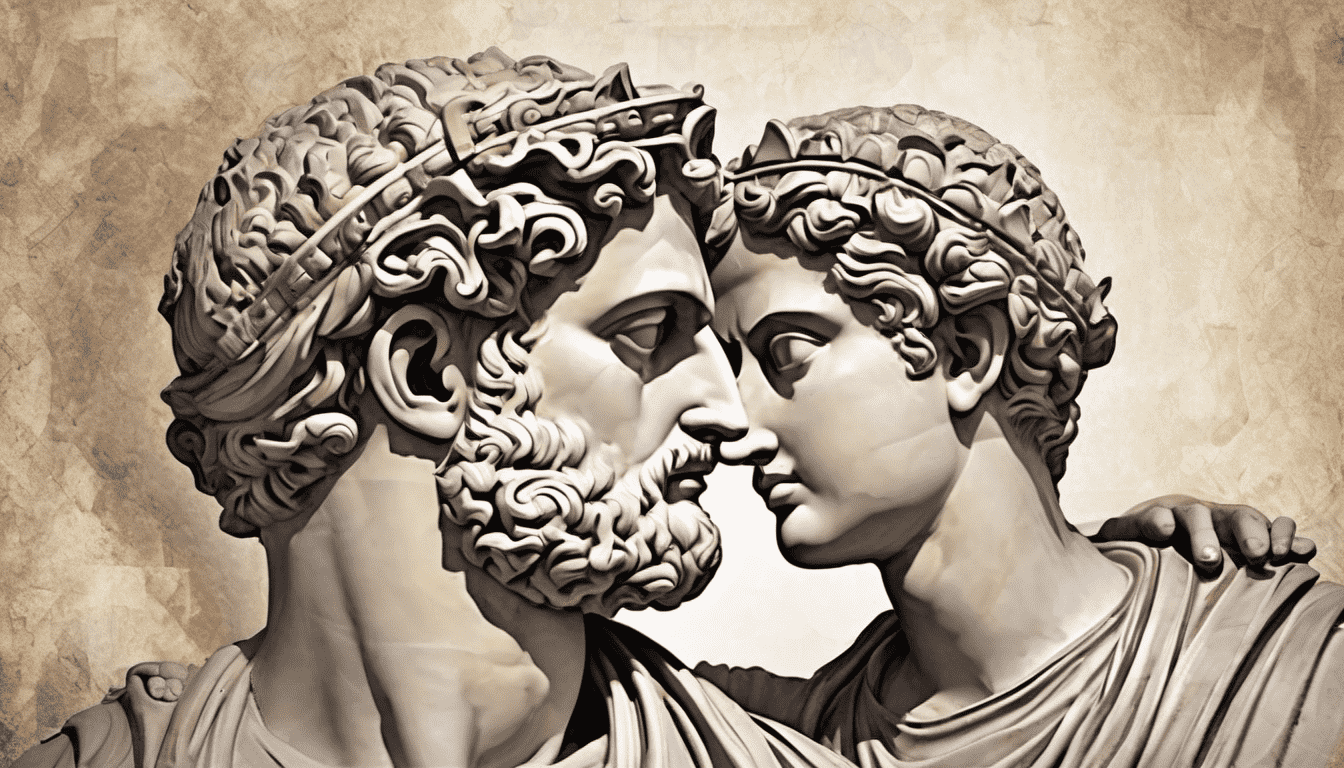I. Introduction
In the enigmatic realm of Stoicism, where tranquility meets resilience, a poignant question emerges: Do Stoics truly feel love? Contrary to popular misconceptions, Stoicism doesn’t advocate for emotional austerity but rather offers a profound insight into the nature of love within its philosophical framework. Stoics, deeply rooted in virtue ethics, perceive love not merely as a fleeting passion but as a deliberate choice guided by reason and wisdom. For Stoics, love transcends mere sentimentality; it embodies the essence of virtue and compassion.
From the profound bonds forged between mentors and disciples to the unwavering devotion to the common good, Stoic love permeates every facet of human connection. Drawing inspiration from luminaries like Marcus Aurelius and Epictetus, Stoicism elucidates a path where love intertwines with inner peace, resilience, and the pursuit of excellence. Thus, while Stoics navigate the turbulent seas of life with unwavering resolve, their hearts remain steadfastly anchored in the profound depths of love’s enduring embrace.

A : Brief overview of Stoicism and its core principles
In the tumultuous landscape of ancient philosophy, Stoicism emerges as a beacon of unwavering fortitude and inner strength. At its core, Stoicism is not merely a philosophical school but a profound way of life, offering solace and guidance in the face of life’s adversities. Rooted in the teachings of revered figures such as Zeno of Citium, Epictetus, and Marcus Aurelius, Stoicism beckons the weary soul to embrace the virtues of wisdom, courage, temperance, and justice. It champions the notion of living in accordance with nature, navigating the turbulent currents of existence with stoic resilience and unyielding determination.
Central to Stoicism is the concept of the dichotomy of control, urging individuals to focus their energies on what they can control while accepting with grace that which they cannot. This timeless philosophy exhorts practitioners to cultivate an inner citadel, impervious to the whims of fate and the vicissitudes of fortune. In the stoic’s universe, adversity is not a foe to be feared but a crucible for growth and self-discovery. Stoicism invites the seeker to embark on a journey of profound introspection, where the tumult of emotions yields to the serene tranquility of the Stoic sage.
Thus, amidst the chaos and cacophony of life, Stoicism stands as a bastion of serenity, offering solace to the weary traveler in search of meaning and purpose.
B. Introduction to the topic of love within Stoicism
In the ethereal realm of Stoic philosophy, the exploration of love unveils a profound tapestry of human emotion and virtue. Despite misconceptions portraying Stoics as emotionally austere, their understanding of love transcends mere sentimentality, delving into the very essence of human connection.
Within the stoic paradigm, love is not a capricious whim but a deliberate choice guided by reason and virtue. Stoicism invites us to ponder the nature of love through the lens of wisdom, temperance, courage, and justice – the cardinal virtues that form the bedrock of Stoic ethics. It exhorts practitioners to embrace love as an integral aspect of the human experience, intertwining with the pursuit of eudaimonia, or flourishing. From the profound bonds forged between mentors and disciples to the altruistic love for humanity embodied in the Stoic concept of cosmopolitanism, love permeates every facet of Stoic philosophy.
Drawing inspiration from revered Stoic sages such as Seneca, Epictetus, and Marcus Aurelius, we glean insights into the transformative power of love in shaping our character and guiding our actions. Thus, within the hallowed halls of Stoicism, love emerges not as a fleeting emotion but as a beacon of virtue, illuminating the path to inner tranquility and ethical living.
C : Exploring whether Stoics experience and embrace love within their philosophical framework.
Within the hallowed halls of Stoicism, the inquiry into whether Stoics experience and embrace love resonates like thunder in a silent night. Contrary to misconceptions, Stoicism doesn’t cast love aside in favor of stoic indifference; rather, it unveils a profound understanding of love within its philosophical tapestry. Stoics, imbued with an unwavering commitment to virtue and reason, navigate the labyrinth of human emotions with serene equanimity.
While they may not succumb to the tempestuous whims of passion, Stoics embrace a deeper, more enduring form of love rooted in wisdom and compassion. Through the Stoic lens, love becomes a deliberate choice, guided by the cardinal virtues of wisdom, temperance, courage, and justice. From the tender affection shared between family and friends to the altruistic love for humanity, Stoics recognize love as an integral aspect of the human experience, intertwining with the pursuit of eudaimonia, or flourishing.
Drawing inspiration from the lives of Stoic sages like Epictetus, Seneca, and Marcus Aurelius, we witness the transformative power of love in shaping character and guiding ethical conduct. Thus, within the stoic framework, love emerges not as a fleeting emotion but as a beacon of virtue, illuminating the path to inner tranquility and ethical living in the tumultuous sea of existence.
II. Understanding Stoic Love

A : Definition of love from a Stoic perspective
1. Examination of Stoic teachings on emotions and desires
Stoicism, an ancient philosophical tradition, offers profound insights into the nature of emotions and desires. Central to Stoic teachings is the notion that individuals possess the ability to cultivate inner tranquility by mastering their reactions to external events. Stoics believe in the importance of distinguishing between what is within one’s control, such as attitudes and responses, and what lies beyond, such as external circumstances.
This dichotomy of control forms the foundation for understanding emotions and desires within the Stoic framework. Rather than being governed by fleeting passions, Stoics advocate for cultivating a state of apatheia, or equanimity, characterized by a serene acceptance of life’s vicissitudes. Through disciplined practice and philosophical reflection, individuals can learn to temper their desires and emotions, aligning them with reason and virtue. Stoicism encourages the cultivation of virtuous desires, such as the pursuit of wisdom and the common good, while cautioning against excessive attachment to external goods or outcomes. By fostering a harmonious relationship between reason and desire, Stoicism offers a practical path to inner peace and moral integrity amidst the complexities of human experience.
As Stoic philosopher Epictetus famously remarked, “It is not things themselves that disturb people, but their judgments about those things.” This timeless wisdom underscores the Stoic approach to emotions and desires, emphasizing the importance of cultivating a resilient and balanced mindset in navigating life’s challenges.
2. How Stoics differentiate between healthy and unhealthy forms of love
Within the Stoic philosophical tradition, discerning between healthy and unhealthy manifestations of love emerges as a crucial tenet in ethical discernment. Stoics advocate for a nuanced understanding of love that aligns with virtue and reason, eschewing attachments rooted in vice or irrationality. Healthy love, from the Stoic perspective, is characterized by a commitment to the common good and the pursuit of wisdom.
This form of love fosters mutual respect, compassion, and cooperation, enriching the lives of both individuals and communities. Unhealthy love, on the other hand, arises from excessive attachment to external goods or outcomes, leading to emotional turmoil and moral confusion. Stoics caution against placing undue importance on transient pleasures or possessions, which can distract from the pursuit of eudaimonia, or flourishing. By cultivating a discerning mindset grounded in Stoic principles, individuals can navigate the complexities of human relationships with clarity and integrity. Stoicism encourages the cultivation of virtuous love, wherein individuals prioritize the well-being of others and strive for mutual growth and fulfillment.
As Stoic philosopher Seneca aptly observed, “True happiness is to enjoy the present, without anxious dependence upon the future.” This wisdom underscores the Stoic approach to love, emphasizing the importance of aligning our affections with reason and virtue for a life of ethical flourishing.
B . The role of rationality in Stoic love
1. Analysis of the Stoic concept of “philosophical love”
In Stoic philosophy, the concept of “philosophical love” encapsulates a profound appreciation for wisdom, virtue, and the pursuit of moral excellence. Unlike conventional notions of romantic or platonic love, philosophical love transcends individual attachments, encompassing a deep reverence for the principles of Stoicism and a commitment to living in accordance with nature. Stoics believe that true fulfillment and flourishing arise from cultivating a love for wisdom, or philosophia, which serves as the guiding beacon in navigating life’s complexities.
Philosophical love entails a profound reverence for the inherent dignity and worth of all human beings, grounded in the Stoic belief in cosmopolitanism – the idea that all people are citizens of the world and interconnected by a shared humanity. Through philosophical love, Stoics cultivate empathy, compassion, and altruism, fostering a sense of kinship and solidarity with others. This form of love extends beyond the boundaries of individual relationships or personal desires, encompassing a broader commitment to the common good and the pursuit of virtue. As Stoic philosopher Marcus Aurelius remarked, “The happiness of your life depends upon the quality of your thoughts: therefore, guard accordingly.”
This timeless wisdom underscores the Stoic understanding of philosophical love as a transformative force that enriches not only individual lives but also the fabric of society, promoting harmony, justice, and moral integrity.
2. How Stoics prioritize virtue and wisdom in their relationships
Stoicism, renowned for its emphasis on moral integrity and inner resilience, guides individuals to prioritize virtue and wisdom in their relationships. Stoics view relationships as opportunities for ethical growth and mutual support rather than mere sources of personal gratification. Central to Stoic teachings is the concept of living in accordance with nature, which entails aligning one’s actions and relationships with the virtues of wisdom, courage, temperance, and justice.
In Stoic philosophy, virtuous relationships are characterized by mutual respect, honesty, and a shared commitment to ethical living. Stoics recognize that genuine fulfillment arises not from external possessions or fleeting pleasures but from cultivating meaningful connections grounded in virtue. By prioritizing virtue and wisdom in their relationships, Stoics seek to foster harmony, authenticity, and moral integrity. Through disciplined practice and philosophical reflection, individuals can cultivate the virtues necessary for nurturing healthy, resilient, and fulfilling relationships. Stoicism encourages practitioners to approach interactions with others with equanimity, compassion, and a deep sense of empathy, recognizing the inherent dignity and worth of all human beings.
As Stoic philosopher Epictetus famously stated, “We have two ears and one mouth so that we can listen twice as much as we speak.” This timeless wisdom underscores the Stoic commitment to prioritizing virtue and wisdom in relationships, fostering mutual understanding, empathy, and ethical flourishing.
C . Exploring the Stoic practice of amor fati (love of fate) and its relationship to love
1 . Acceptance of the present moment and the people in it
In the realm of Stoicism, acceptance of the present moment and the individuals within it emerges as a cornerstone of inner tranquility and ethical living.
Stoics advocate for embracing the present moment with equanimity, recognizing it as the only reality within our control. By cultivating mindfulness and acceptance, individuals can liberate themselves from the burden of regret over the past or anxiety about the future. Stoicism teaches that the acceptance of the present moment entails acknowledging and embracing the inherent imperfections and uncertainties of life, while striving to respond with wisdom and virtue. This practice fosters a sense of gratitude for the opportunities and challenges presented in each moment, allowing individuals to cultivate a deeper connection with themselves and others.
Through disciplined practice and philosophical reflection, Stoics learn to approach interactions with others with humility, empathy, and a profound appreciation for the unique humanity inherent in each individual. As Stoic philosopher Marcus Aurelius observed, “Accept the things to which fate binds you, and love the people with whom fate brings you together, but do so with all your heart.” This timeless wisdom underscores the Stoic commitment to embracing the present moment and the people within it with grace and humility, fostering inner peace and ethical flourishing.
2 . Embracing love as part of the natural order and the Stoic idea of cosmopolitanism.
Within Stoicism, embracing love as part of the natural order intertwines seamlessly with the concept of cosmopolitanism, reflecting a profound understanding of human interconnectedness and ethical responsibility. Stoics believe that love, in its purest form, arises from recognizing and embracing the inherent interconnectedness of all beings within the cosmos.
This perspective encourages individuals to transcend narrow tribal affiliations and embrace a broader sense of kinship with all humanity. Stoic cosmopolitanism teaches that we are citizens of the world, bound together by a shared humanity and a common destiny. Through the lens of cosmopolitanism, Stoics cultivate a sense of empathy, compassion, and solidarity with others, recognizing that love transcends the boundaries of nationality, race, or creed.
By embracing love as part of the natural order and embodying the Stoic ideal of cosmopolitanism, individuals can foster a more inclusive and compassionate society, characterized by mutual respect, understanding, and cooperation. As Stoic philosopher Epictetus famously remarked, “If you wish to be a writer, write. If you wish to be a philosopher, then philosophize.” This timeless wisdom underscores the Stoic commitment to embracing love as an essential component of ethical living and harmonious coexistence within the interconnected web of the cosmos.
III. Love in Practice: Stoic Principles Applied

A . Stoic techniques for cultivating love and compassion.
1 . The practice of Stoic mindfulness and its impact on relationships.
Stoic mindfulness, deeply rooted in the philosophical tradition of Stoicism, offers profound insights into the cultivation of resilient and fulfilling relationships. Through the practice of mindfulness, Stoics learn to cultivate a heightened awareness of their thoughts, emotions, and reactions in the present moment. This disciplined introspection enables individuals to respond to interpersonal interactions with clarity, equanimity, and compassion.
By embracing Stoic mindfulness, individuals can navigate the complexities of relationships with greater wisdom and insight, fostering deeper connections and mutual understanding. The practice of mindfulness encourages individuals to approach relationships with humility, empathy, and a profound appreciation for the inherent dignity and worth of others. As Stoic philosopher Seneca observed, “We are more often frightened than hurt; and we suffer more from imagination than from reality.” This timeless wisdom underscores the Stoic understanding of mindfulness as a transformative practice that fosters resilience, empathy, and ethical integrity in relationships. Through the cultivation of Stoic mindfulness, individuals can cultivate deeper connections, navigate conflicts with grace, and foster harmonious relationships grounded in virtue and wisdom.
2 . Exercises such as negative visualization and premeditation of adversity in fostering appreciation and love
Within the realm of Stoicism, exercises like negative visualization and the premeditation of adversity serve as potent tools for fostering appreciation and love in relationships. Negative visualization involves contemplating the loss of cherished possessions or loved ones, thereby cultivating gratitude for their presence in our lives.
By mentally preparing for potential hardships or losses, Stoics develop a deeper appreciation for the people and blessings they currently possess. Similarly, the premeditation of adversity encourages individuals to anticipate and mentally rehearse challenges they may face, enabling them to respond with resilience and equanimity when adversity inevitably arises. Through these exercises, Stoics learn to embrace the impermanent nature of life and cherish each moment with loved ones, fostering a profound sense of gratitude, empathy, and love. As Stoic philosopher Epictetus famously remarked, “It’s not what happens to you, but how you react to it that matters.
” This timeless wisdom underscores the Stoic understanding of adversity as an opportunity for growth and appreciation, enriching relationships with authenticity, resilience, and enduring love.
B . Case studies of Stoic figures and their expressions of love.
1 . Examples from the lives of Epictetus, Seneca, and Marcus Aurelius.
Epictetus, Seneca, and Marcus Aurelius, renowned Stoic philosophers, exemplify the principles of Stoicism through their lives and teachings. Epictetus, born a slave, rose to prominence as a philosopher known for his emphasis on personal agency and resilience in the face of adversity. His discourses on maintaining inner tranquility amidst external challenges continue to inspire Stoics today. Seneca, a statesman and advisor to Emperor Nero, emphasized the importance of virtue and moral integrity in navigating the complexities of political life.
Despite facing persecution and exile, Seneca’s writings on Stoic ethics and the pursuit of wisdom remain influential. Marcus Aurelius, the Roman Emperor and author of the “Meditations,” epitomized Stoic principles through his commitment to duty, humility, and self-discipline. His reflections on the transient nature of life and the importance of living in accordance with nature resonate deeply with contemporary Stoics seeking guidance in the pursuit of eudaimonia, or flourishing. Through their exemplary lives and enduring wisdom, Epictetus, Seneca, and Marcus Aurelius continue to inspire countless individuals on the path of Stoicism, demonstrating the transformative power of philosophical principles in shaping character and guiding ethical conduct.
2 . How Stoic principles influenced their relationships and expressions of love.
Stoic principles profoundly influenced the relationships and expressions of love of philosophers such as Epictetus, Seneca, and Marcus Aurelius. These Stoic luminaries emphasized the cultivation of virtue, wisdom, and resilience in their interactions with others. Epictetus, for instance, advocated for maintaining inner tranquility and treating others with kindness and empathy, regardless of their circumstances. Seneca, known for his moral integrity and commitment to Stoic ethics, emphasized the importance of mutual respect and compassion in fostering meaningful connections.
Similarly, Marcus Aurelius, in his “Meditations,” reflected on the interconnectedness of humanity and the importance of embracing love as a guiding principle in ethical living. These Stoic philosophers demonstrated through their lives and writings that love, grounded in virtue and reason, serves as a powerful force for personal growth and moral integrity. By prioritizing the virtues of wisdom, courage, temperance, and justice in their relationships, they exemplified the transformative potential of Stoicism in fostering deeper connections and fostering a more compassionate and harmonious society.
C . Addressing misconceptions and criticisms.
1 . Common misconceptions about Stoics being emotionally detached.
Common misconceptions often portray Stoics as emotionally detached individuals, yet this interpretation overlooks the nuanced understanding of emotions within Stoicism. Stoics do not advocate for emotional suppression or detachment; rather, they emphasize cultivating a healthy relationship with emotions through reason and virtue. Stoicism teaches individuals to acknowledge and accept their emotions while maintaining inner tranquility and equanimity. Rather than being devoid of feeling, Stoics strive for emotional resilience and clarity, recognizing that excessive attachment to emotions can cloud judgment and hinder moral growth.
Stoic philosophers like Epictetus and Marcus Aurelius exemplified this balanced approach, demonstrating profound empathy and compassion in their interactions with others. Through the practice of Stoicism, individuals learn to harness the power of emotions as a catalyst for personal growth and ethical living. Thus, rather than being emotionally detached, Stoics aspire to cultivate a harmonious integration of reason, virtue, and emotion in their pursuit of eudaimonia, or flourishing.
2 . Clarification on how Stoicism encourages a deep and meaningful experience of love while maintaining emotional equilibrium.
Stoicism offers a nuanced perspective on love, advocating for a deep and meaningful experience while maintaining emotional equilibrium. Contrary to misconceptions, Stoics do not suppress emotions but rather seek to channel them wisely through the lens of reason and virtue. By cultivating inner tranquility and resilience, Stoics are better equipped to navigate the complexities of love with clarity and integrity. Stoicism teaches individuals to prioritize virtuous love, grounded in empathy, compassion, and the pursuit of the common good. This approach fosters authentic connections and fosters a sense of harmony in relationships.
Stoic philosophers like Seneca and Epictetus emphasized the importance of maintaining emotional balance while embracing love as an essential aspect of the human experience. Through disciplined practice and philosophical reflection, Stoics learn to appreciate the beauty of love without being consumed by its transient passions. Thus, Stoicism offers a path to a deep and meaningful experience of love, where emotional equilibrium and ethical integrity coexist harmoniously, enriching both individual lives and the fabric of society.







